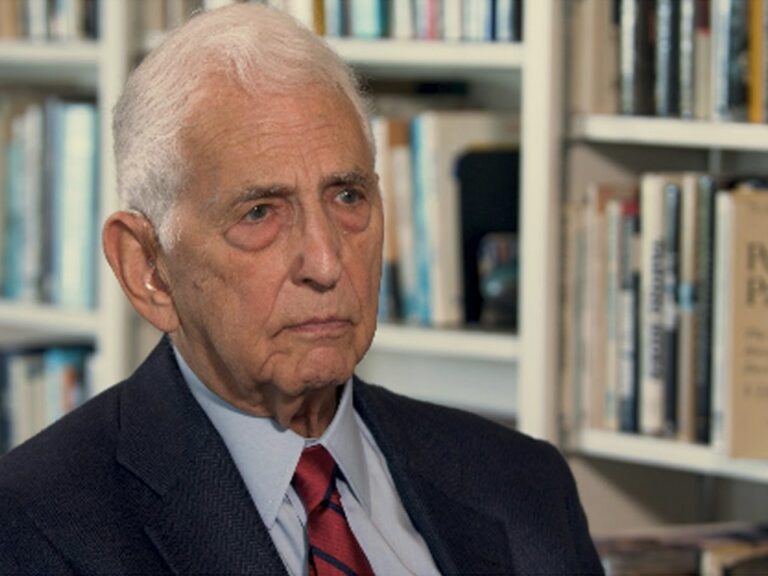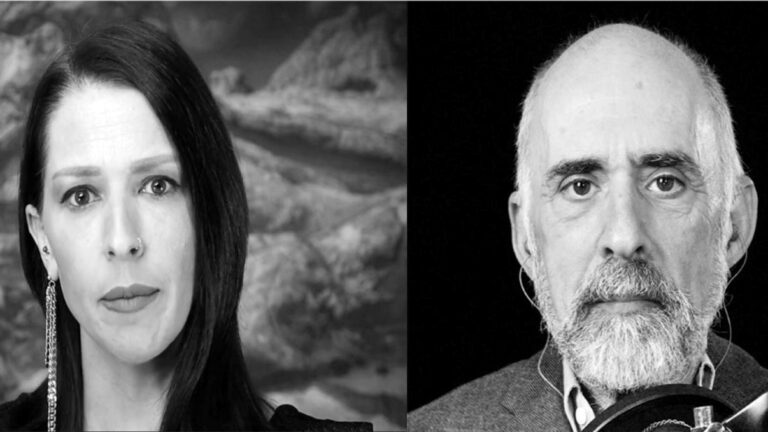This interview was originally published on June 5, 2011. Lawrence Wilkerson, Collin Powell’s former Chief of Staff, reflects on his life journey from “cold warrior” to harsh critic of US foreign policy.
Reality Asserts Itself with Lawrence Wilkerson (2011)
PAUL JAY, SENIOR EDITOR, TRNN: Welcome to The Real News Network. I’m Paul Jay in Washington. This is the third in our series of interviews with Lawrence Wilkerson, who joined the American Army in 1966 to go to Vietnam to fight for truth, justice, and the American way and in 2011 is one of the harshest critics of very much that same foreign policy. Now joining us to continue our story is Larry Wilkerson. Thanks for joining us again.
LAWRENCE WILKERSON, FMR. CHIEF OF STAFF TO COLIN POWELL: Thanks for having me.
JAY: So let’s pick up from you’re called from your job teaching at the Navy College, and you’re now going to be interviewed by Colin Powell. So what was the interview like? What did he ask you, and what was the exchange?
WILKERSON: Two things I remember from the interview. It lasted hours. But two things I remember, I’ll always remember. One, he asked me if I could write a speech for a black Baptist church. I told him, no, but I’d try. He said, don’t worry; I can do that. And then he asked me if I wanted the job, and I told him no, that I was very happy teaching and content where I was, which I thought probably killed my chances for getting the job. It didn’t. He hired me.
JAY: Did you want it?
WILKERSON: No, not really. I enjoyed teaching, and I realized this was going to be into an area I was not expert in. I didn’t know anything about speech writing. I would have to study and learn, especially study him and learn him. And I wasn’t all that tempted by it. And he later told me, many years later told me, you know why I hired you? I hired you because you didn’t want the job and I didn’t want an ambitious little shit around me.
JAY: So what was he doing? And then, what was your job? What was his responsibilities, and what were yours?
WILKERSON: He’d just come out of the national security advisor’s job for President Reagan and had been promised a fourth star by the chief of staff of the Army and the job at United States Forces Command in Atlanta, which would mean he was commanding all the US Army forces in the United States of America and its territories.
JAY: And your job for him?
WILKERSON: I was going to be his speech writer. I was technically listed as deputy executive officer, but I was essentially his speech writer.
JAY: Now, in terms of understanding how the world works, in terms of our earlier segments of the interview, we’re talking about war is something more realistic, understanding what the real objectives are. Were you and him on the same page?
WILKERSON: Well, here’s a man who essentially told me in his office, once we got down to Atlanta, I am not going to be your typical army general. I’ve just come from being national security advisor for the president of the United States. I was on Long Island when President Bush and Gorbachev and Reagan met. I was in St. Catherine’s Palace. I saw the look in Gorbachev’s eyes when Gorbachev said in English, what do you do when the devil dies, General? Because Gorbachev knew who I was beneath the national security advisor. So I’m not going to be your standard Army general and retreat into the woodwork. I’m going to speak out. I’m going to speak out and I’m going to ask the question of my audiences: what do you do when the devil dies? What does the preacher do when the devil dies? Because the devil is dying.
JAY: Meaning the Soviet Union’s not the big, bad enemy anymore.
WILKERSON: This got him all kinds of letters and cards, former generals saying, what are you doing, are you nuts. Bob Gates sent him a note: the bear will be back; don’t worry; it’ll be back; don’t be talking about the bear being dead. He was sort of overstepping his bounds as a serving active-duty military officer. He was essentially making policy or attempting to influence policy from his position as commander of Forces Command.
JAY: So you’ve got a general and a speech writer who both think. And go from there.
WILKERSON: We’re trying to stop what Harry Truman called at the end of World War II not a demobilization but a disintegration of the Armed Forces. That’s what Powell’s purpose was. He was trying to say there’s going to be a hell of a demand for a peace dividend. There is going to be one heck of a reaction by the American people, by the Congress, and they’re going to want to take the military forces apart because the bear is dead. So what’s–.
JAY: What year are we in now?
WILKERSON: This is 1989. So we want to do this carefully. And when he becomes chairman of the joint chiefs of staff, of course, he does this very carefully. He builds–beneath Dick Cheney and George H. W. Bush, he builds what he calls the base force, which is more or less a military structure below which we did not want to go. And we did not want to go below it, because he built a strategy behind that force that said we needed to be able to do a war in North Korea–he said Northeast Asia–a war in Southwest Asia–Iraq or whatever–and possibly a little peacekeeping or a job like that at the same time. And in order to do that, you had to had to have a certain force.
JAY: Did he ever question, did you ever discuss with him and did it enter your thinking that maybe this whole conception of the role of the United States in the world ain’t good for America?
WILKERSON: I don’t think that ever entered Colin Powell’s conception. I think Colin Powell had come up and been given the opportunity which he’d been given, and quite an opportunity it was, not simply because of his talent, which was manifest, but because he had seen this need, had joined the force that met that need, and risen to the top ranks of responsibility in that force, and had dipped into the policy side too, as military advisor to Secretary of Defense Weinberger, and then as deputy national security advisor and national security advisor to President Reagan. So this was a man who’d been in both worlds, the civilian world where the policy is made, and the military world where the policy’s carried out, at the highest levels. And so this was a man who, if you will, brought together, along with personal talent that was enormous, the ability to look into both worlds and to deal with them both in both worlds. It had given him enormous opportunity as a black man that he would not have had otherwise. And so this is a world he’s going to defend. This is a world he is going to be a spokesman for, not an advocate against.
JAY: And did it ever enter at least his discourse with you, the fact that this world ain’t so good for most African-Americans in terms of, you know, incarceration rates and poverty and unemployment? I mean, that’s also this world.
WILKERSON: They say one of the marks of genius is to be able to keep two diametrically opposed ideas in your mind, deal with both of them, and not go nuts. I often questioned and often thought about that dilemma in his mind. He dealt with it by casting this sort of light on the Armed Forces: it is the place where we have done the best job in America institutionally in equalizing the races and treatment thereof. It is a great opportunity for black men and women. It is a tremendous opportunity in terms of getting ahead, in terms of serving your nation, and so forth. And so he always put this positive patina on it, if you will. And you don’t look at the rest of it, because the rest of it’s too nasty. You don’t want to pick up the cover and look at the number of blacks we have in prison, look at the fact that 49 percent of African-American males under 40 are unemployed. I mean, you don’t want–that aren’t in prison. You don’t want to look at that part of it. Or if you do look at it, you look at it from time to time, and you throw a little money in, you throw a little speech in, and you try to do something about it. Otherwise, America’s doing pretty well.
JAY: Now, same thing for you. I mean, you’re aware of these things, too.
WILKERSON: It’s the same thing for me, up until probably about two years into my time as chief of staff in the State Department, when I began to question the whole thing and I began to see that it wasn’t just the inadequacies, the stupidities, the inanities, the power grabs of the Bush administration, that though that was a rare exemplar of the worst side of America, it nonetheless emanated from something that was happening at the very heart of our democratic federal republic, a contamination of that republic that had been happening perhaps since 1950 and had taken on a new acceleration, a new few catalyst elements, perhaps, with Bush and Cheney and Rumsfeld. But nonetheless–and I’ll give you an idea of what I mean here–I was very reluctant to cast a vote for President Obama, not from the point of view that he was different from George W. Bush and Dick Cheney–he was–but from the point of view of I was increasingly convinced that it didn’t matter who the man was, it didn’t matter who the people were around the man; the country was headed in a direction that Democrat or Republican, independent or whatever, could not turn the country around from. We’re owned by the corporate interest. We’re owned by the military-industrial-congressional complex. We’re owned by the financial interests. I mean, you just take your pick of the bogeyman you want to look at that day. And you do not have a leadership in any party that can do much about this. And part of this, of course, is this fascination for war that we’ve developed, because that’s generally what empires in decline do, whether the decline is financial, economic, spiritual, or whatever–and I think our decline is in all those dimensions. The attention begins to go to the management of trouble on the fringes of that empire to keeping people out interested in the fringes of empire, while the rot occurs at the very core. And that’s what’s happening to us right now.
JAY: Okay. So in the next segment of the interview, we’ll go to that period just leading up to your two years into the State Department, when you start to rethink the whole thing. Thanks for joining us. And thank you for joining us on The Real News Network. Please join us for the next segment of our interview with Larry Wilkerson.
Never miss another story
Subscribe to theAnalysis.news – Newsletter
Lawrence Wilkerson is a retired United States Army Colonel and former chief of staff to United States Secretary of State Colin Powell.












